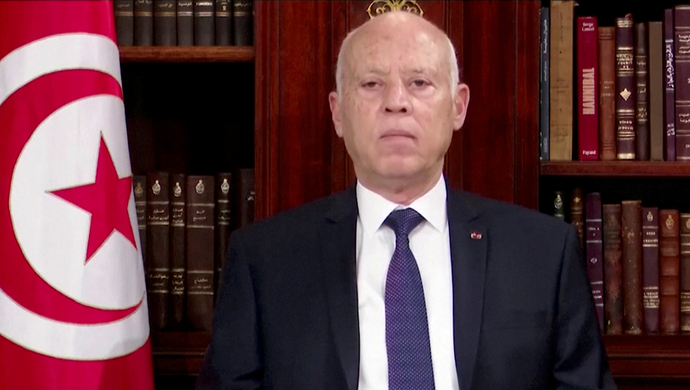A power struggle this week in Tunisia threatens the fragile democracy that was one of the only bright spots in the 2011 Arab Spring. That was the movement a decade ago to oust dictators across the Middle East. Tunisia managed to remove its leader and avoid war or a return to authoritarianism. But yesterday, the president shut down parliament, sending military vehicles to send the message, and claimed to throw out the prime minister. NPR's Ruth Sherlock joins us now from Beirut.
Hi, Ruth.
RUTH SHERLOCK, BYLINE: Hi.
CHANG: So what exactly happened here?
SHERLOCK: Well, in a declaration late on Sunday, Tunisian President Kais Saied invoked emergency powers to dismiss the country's prime minister. And with help from the army, he suspended parliament for 30 days. He's now going to rule by decree, and he's also taken on the role of public prosecutor. This means he can directly send people to court. This has prompted fury and, I think, a degree of panic among the biggest political parties in parliament, who are calling this a coup. This includes the biggest party, Ennahda. They're moderate Islamists. And the head of that party is also a parliamentary speaker and says this is an assault on democracy. So he was stopped by the military from entering parliament, and he's called for people to come out in protest. But here's the thing. In recent days, people have been taking to the streets, but in large demonstrations, actually against the Ennahda Party and in support of the president. So many support the move that the president made Sunday.
CHANG: Interesting. And why would people protest in support of the president?
SHERLOCK: Well, this is a parliamentary system where the president and the prime minister are dividing powers. People blame the prime minister and his cabinet and parliament for this poor economy, unemployment, bad health care and public services in Tunisia these days. People were already holding big protests on Sunday against the Ennahda Party, and it seems the president took this as a kind of cue to take these drastic actions. Mohammed Hammami is this political scientist in Tunis, and he says there's been growing support for the president among Tunisians, with some calling for the dissolution of parliament. He says some people feel nostalgia for the days before the 2011 revolution, when the country was ruled by dictator Zine el-Abidine Ben Ali.
MOHAMMED HAMMAMI: It's more about the perception of things. We used to be under presidential regime under Ben Ali, and people think that situation was better. And to be honest, economically, things deteriorated significantly since 2011.

SHERLOCK: But, you know, this support is not all uniform. So today, you have sit-ins by supporters of Ennahda outside the parliament who are protesting the decision. And they're even likening the Tunisian president to Egypt's leader, Abdel-Fattah el-Sissi, who took power in this military coup after Egypt's democratically elected Muslim Brotherhood lost popularity. The president rejects that this is a coup, but a growing number of rights groups in Tunisia are outright denouncing this as an unconstitutional takeover of power.
CHANG: What about globally? I mean, what are leaders in other countries saying about what's happening right now in Tunisia?
SHERLOCK: Well, in the Middle East, Turkey's ruling party, which has Islamist roots, has condemned the president's actions against the Islamist Ennahda and other parties. Qatar, which has supported Sunni Islamists such as the Muslim Brotherhood, has also called on everyone to avoid an escalation. Meanwhile, Western governments are being quite careful. They're still trying to figure out what's going on. They are avoiding describing this as a coup, for example, but they are signaling concern that the president's actions are dangerous for Tunisia's democracy. The European Union is urging politicians in Tunisia to respect the country's constitution. In the U.S., the White House just put out a statement saying they're urging calm and for the country to keep to democratic principles.
CHANG: That is NPR's Ruth Sherlock in Beirut.
Thank you, Ruth.
SHERLOCK: Thank you.












